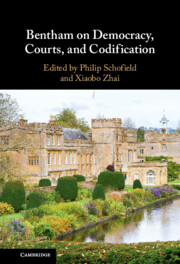Book contents
- Bentham on Democracy, Courts, and Codification
- Bentham on Democracy, Courts, and Codification
- Copyright page
- Contents
- Contributors
- Introduction
- Part I Democracy
- 1 Intellectual Aptitude and the General Interest in Bentham’s Democratic Thought
- 2 Bentham, Democracy, Free Government, and the Relationship between Rulers and Ruled
- 3 The Interests of Women in Bentham’s Late Constitutional Thought
- 4 Religion and Judgement in Bentham’s Political Thought
- 5 Organizing the Utilitarian State
- 6 Bentham on the Corruption of Democracy
- 7 The People’s ‘Greatest Misfortune’ and ‘All the Chance the People Have’
- Part II Law and the Courts
- Part III Codification
- Bibliography
- Index
1 - Intellectual Aptitude and the General Interest in Bentham’s Democratic Thought
from Part I - Democracy
Published online by Cambridge University Press: 25 August 2022
- Bentham on Democracy, Courts, and Codification
- Bentham on Democracy, Courts, and Codification
- Copyright page
- Contents
- Contributors
- Introduction
- Part I Democracy
- 1 Intellectual Aptitude and the General Interest in Bentham’s Democratic Thought
- 2 Bentham, Democracy, Free Government, and the Relationship between Rulers and Ruled
- 3 The Interests of Women in Bentham’s Late Constitutional Thought
- 4 Religion and Judgement in Bentham’s Political Thought
- 5 Organizing the Utilitarian State
- 6 Bentham on the Corruption of Democracy
- 7 The People’s ‘Greatest Misfortune’ and ‘All the Chance the People Have’
- Part II Law and the Courts
- Part III Codification
- Bibliography
- Index
Summary
In my Utility and Democracy, I noted that an important difference between the pre-democratic and post-democratic Bentham consisted in his view of the relationship between property and the franchise. In the earlier phase of his career, he feared that the non-propertied, if given the vote, would in effect destroy civilized life by insisting on a redistribution of property, while in the latter phase he dismissed this threat as illusory and pointed to the United States of America as a functioning large-scale democracy where property was secure.1 While there is no reason to question this account, there is arguably more to be said about how Bentham regarded the problem of bad government, or misrule, and the solution, in terms of the possession of intellectual aptitude – in other words, the possession of knowledge and judgement – one of the branches of appropriate aptitude. An individual possessed intellectual aptitude when he had the relevant knowledge and judgement to promote the general or universal interest, moral aptitude when he was motivated to do so, and active aptitude when he performed the relevant actions.
- Type
- Chapter
- Information
- Bentham on Democracy, Courts, and Codification , pp. 21 - 43Publisher: Cambridge University PressPrint publication year: 2022
- 1
- Cited by

